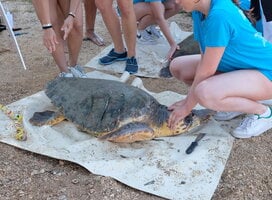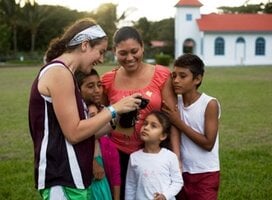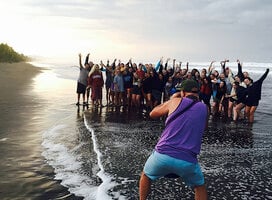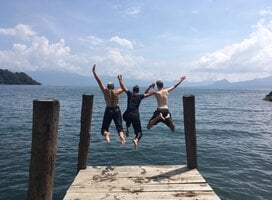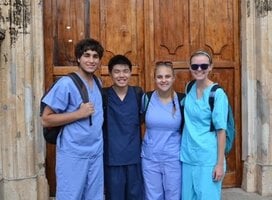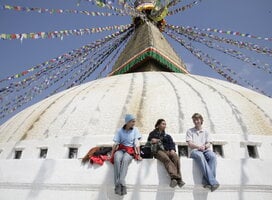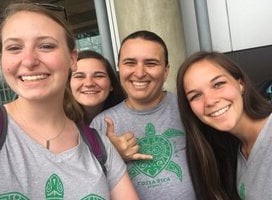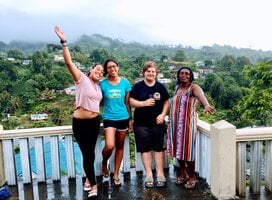High School Volunteer Abroad in Costa Rica
Costa Rica has made a name for itself as a hotspot for ecotourism and adventure travel. An abundance of tropical jungles, beaches, volcanoes, wildlife refuges, and national parks provide countless draws for a prospective volunteer. /p>
But it's not just the animals and adventure travel that attract millions of tourists each year; Costa Ricans are known for their hospitality toward foreigners. Tourism is a important industry and goes hand in hand with conservation efforts. Volunteers are integral to the protection of the delicate ecosystems that make Costa Rica the biologically unique place that it is.
As Costa Rica is a hotspot for biological and ecological diversity, volunteer opportunities are as abundant as the variety of butterflies you may see. In fact, 25% of Costa Rica's landmass is protected by extensive national parks and reserve systems. Note that during summer break, the rainy season is in effect. Depending on the region, daily rain showers create the lush rain forest Costa Rica is known for.
Wildlife conservation
Within this field, there are a wide variety of projects available. Animal-monitoring programs can include assisting in habitat-mapping and population tracking as well as caring for rescued animals. Sea turtle conservation projects are quite popular because so many of the turtle species are listed as endangered or critical. Poaching is an ever-present problem, and many organizations focus on monitoring and protecting nest sites. Populations of big cats and primates are the focus of other conservation projects and afford a volunteer the opportunity to assist and learn about surveying techniques and data collection.
Ecological conservation
Take part in habitat restoration and reforestation projects around rural villages. While Costa Rica has an impressive list of parks and reserves, environmental degradation is still an issue, particularly around communities that have minimal access to alternative resources or lack the expertise of sustainability. Volunteers can help campaign for sound conservation practices and help reestablish native species.
Community Development
Many communities in the countryside lack access to adequate sanitation, medical facilities, and schools. Projects to meet these needs may include construction of facilities, agricultural development, and public education programs. Can't get enough coffee? Volunteer on a coffee plantation and help the farmers harvest and roast the beans.
Teaching English
Schools in rural communities often don't have the resources to provide more than a basic education. Volunteers can teach English to children, but many programs also have room for other subjects like art or sports. Sharing your passion with the locals could be a rewarding way to spend a summer break.
For students, summer vacation is going to be the prime time of the year to volunteer. Some companies are based out of San Jose, but the wildlife and eco-conservation programs are typically located in parks, reserves, or rural communities outside the main cities. While those locations may look remote on the map, Costa Rica is not a large country and has a strong tourism base catering to patrons from North America and Europe, and so logistics and accommodations may not be quite as rustic as they might be in less-developed countries.
Most programs start at 1 week, but if one were so inclined, most of the summer could be spent working within an organization. Check with the host organization to ensure that all lodging, food, and transportation will be covered.
Visas
A passport valid for 6 months beyond one's trip duration is required for entry. Travelers from the U.S., Canada, and Europe can stay in the country for up to 90 days without a visa.
Health and Safety
Travelers are advised to speak to a travel medicine specialist 4 to 6 weeks before departure. Travelers should be current on all routine vaccinations and it is recommended that vaccinations be given for hepatitis A and typhoid as well.
Volunteers working with animals or in remote locations should discuss with their travel medicine specialist whether or not vaccination against rabies is appropriate. Fortunately the risk for insect-borne diseases such as malaria and chikungunya is extremely low. Dengue does exist and it is advised to use chemical prophylaxis, such as DEET, against mosquitos.
The water in Costa Rica is considered safe to drink in most places. Contact the organization you will be working with and see what they advise for their volunteers. Should there be any concerns on the part of the volunteer, bottled water or purification would be the best option.
Costa Rica can be hot and sunny, and so sunscreen should be used to avoid burns that would add an unnecessary annoyance to one's volunteer experience.
Standard precautions should be taken to avoid crime. Remain cognizant of your belongings and your surroundings, particularly in crowded markets and around transportation hubs.
Cultural immersion/extracurricular activities
Many volunteer programs have additional components worth considering. A few weeks in a homestay can be a great opportunity to bring a student's Spanish out of the textbook and turn it into an effective tool of communication. The host organization may also be able to line up any number of fun activities to round out a summer adventure: zip lining, white-water rafting, trekking, bird watching, surfing, sea kayaking, dance classes, or cooking classes (just to name a few!).
